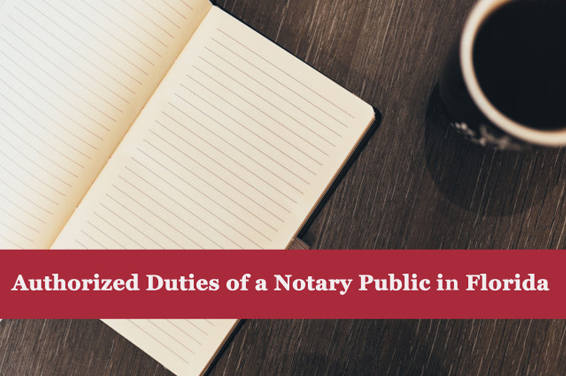Florida Notary Public Updates
Authorized Duties of a Notary Public in Florida
The duties that a notary public is authorized to perform varies from state to state. As a notary public in Florida, you are permitted to execute 6 different notarial acts under your commission. To avoid future issues with liability, it is imperative to know exactly what each of these acts entail.
Oaths
Administering an oath involves a person pledging that the contents of a document or a statement are truthful. Oaths are also utilized in oral depositions.
Some important things to remember when administering an oath:
- Always require the physical presence of the person affirming the truthfulness of the document. Make no exceptions.
- Be sure to witness the signing of the document.
Acknowledgments
Acknowledgments are simpler than oaths. The notary public’s job in this instance is to merely witness the document being signed and to make certain that the document is being signed voluntarily. In this instance, content is not as important. The notary public needs only to ensure that the signer is knowledgeable about what signing the document entails.
Some important things to remember when taking acknowledgements:
- Scan the document for completeness. Never notarize a document that could potentially be altered post-notarization.
- It is imperative you confirm that the signer is aware of the document’s contents and that they are signing of their own free will.
Attested Photocopies
When making an attested photocopy, your job as a notary public is to ensure and certify that the photocopy is a true copy of the original document.
Some important things to remember when making attested photocopies:
- Check that the document being photocopied is an original. Never notarize a photocopy of a photocopy.
- Make certain that the document can legally be made into an attested photocopy. Birth certificates, death certificates, and marriage and divorce records are a few examples of documents that it is illegal to make an attested copy of.
- Make the copy yourself or witness the copy being made.
Marriages
One of the most unique aspects of being a notary public in the state of Florida is the ability to solemnize marriages. Florida is one of only four states in the U.S. that allow notary publics to perform marriage ceremonies.
Some important things to remember when solemnizing a marriage:
- It is best to obtain the marriage license from the bride and groom before performing the ceremony.
- As a notary public, it is important that you determine consent between the two parties. This requires the physical presence of both the bride and the groom at the time of the marriage ceremony.
- DO NOT FORGET to return the marriage license and record to the County Clerk’s office within 10 days of the ceremony. This is your responsibility.
Verifying Vehicle Identification Numbers (VIN)
This involves a physical inspection of the vehicle to verify the VIN on the form matches the VIN plate.
Some important things to remember when verifying vehicle identification numbers:
- This notarial act is often performed by someone working at a car dealership. If you are unfamiliar with the process and are asked to perform it, it is probably best to direct the client to a notary public in this line of work.
Certifying Contents of Safety Deposit Boxes
When a safety deposit box is opened, it is your job as the notary public to witness the opening. In addition, you are responsible for a certificate listing, in entirety, the contents of the box.
Some important things to remember when certifying contents of safety deposit boxes:
- Make certain that you personally remove the contents of the box. Do not leave this task to someone else.
Finally, here are some important things to remember when performing any of your authorized duties as a notary public:
- You are responsible for what you notarize. This responsibility does not disappear if your commission expires. The best way to avoid future liability is to meticulously record the details of every notarization in a record book. Though this is not required by the state of Florida, it is highly recommended.
- With the exception of solemnizing marriages, never perform notarial acts for family members or for situations in which you have some form of invested interest. If you have something to gain from the notarization, no matter how small, it compromises your ability to remain unbiased.
- Remember that you can always decline a notarization if you feel pressured or uncomfortable in performing the act. If something feels wrong to you about the situation, remove yourself from it.

